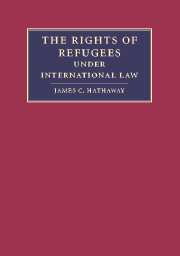Book contents
- Frontmatter
- Contents
- Acknowledgments
- Table of cases
- Table of treaties and other international instruments
- Abbreviations for courts and tribunals cited
- Introduction
- 1 International law as a source of refugee rights
- 2 The evolution of the refugee rights regime
- 3 The structure of entitlement under the Refugee Convention
- 4 Rights of refugees physically present
- 5 Rights of refugees lawfully present
- 6 Rights of refugees lawfully staying
- 7 Rights of solution
- Epilogue: Challenges to the viability of refugee rights
- Appendices
- Select bibliography
- Index
6 - Rights of refugees lawfully staying
Published online by Cambridge University Press: 06 January 2010
- Frontmatter
- Contents
- Acknowledgments
- Table of cases
- Table of treaties and other international instruments
- Abbreviations for courts and tribunals cited
- Introduction
- 1 International law as a source of refugee rights
- 2 The evolution of the refugee rights regime
- 3 The structure of entitlement under the Refugee Convention
- 4 Rights of refugees physically present
- 5 Rights of refugees lawfully present
- 6 Rights of refugees lawfully staying
- 7 Rights of solution
- Epilogue: Challenges to the viability of refugee rights
- Appendices
- Select bibliography
- Index
Summary
A significant number of important rights accrue to refugees only once they are “lawfully staying” in a state party. These include the right to engage in wage-earning employment and to practice a profession, freedom of association, access to housing and welfare, to benefit from labor and social security legislation, intellectual property rights, and the entitlement to receive travel documentation.
As previously described, a refugee is lawfully staying (résidant régulièrement) when his or her presence in a given state is ongoing in practical terms. This may be because he or she has been granted asylum consequent to formal recognition of refugee status. But refugees admitted to a so-called “temporary protection” system or other durable protection regime are also lawfully staying. So long as the refugee enjoys officially sanctioned, ongoing presence in a state party, he or she is lawfully staying in the host country; there is no requirement of a formal declaration of refugee status, grant of the right of permanent residence, or establishment of domicile. On the other hand, rights which require lawful stay do not accrue to refugees awaiting the results of a formal process of status verification, as the purely provisional nature of such persons' presence in the host state is at odds with the Convention's reservation of these more integration-oriented rights for those who are expected to remain in the state party for a significant period of time.
- Type
- Chapter
- Information
- The Rights of Refugees under International Law , pp. 730 - 912Publisher: Cambridge University PressPrint publication year: 2005



